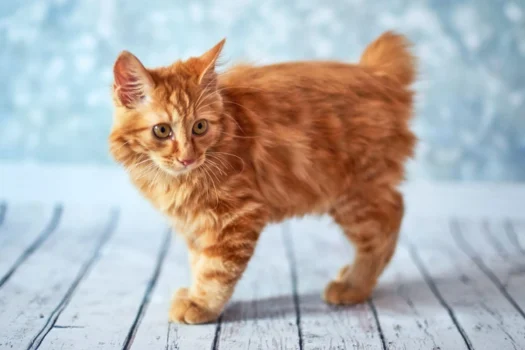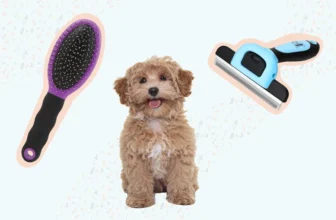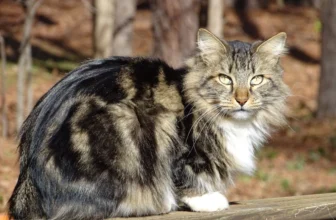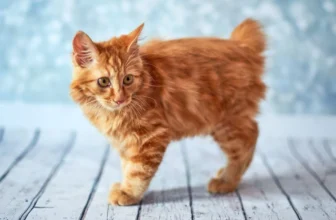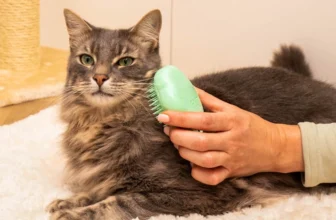As cat owners, we often focus on keeping our furry friends happy and healthy. However, dental health is a crucial component of overall wellness that is often overlooked. This is especially true for American Bobtails, a breed known for their strong jaw and teeth. It’s important to understand the link between diet and dental health, as well as how to prevent oral health problems. In this article, we’ll provide dietary tips and additional advice to help maintain your American Bobtail’s dental health. So, let’s dive into the details!
The Importance of Dental Health for American Bobtails
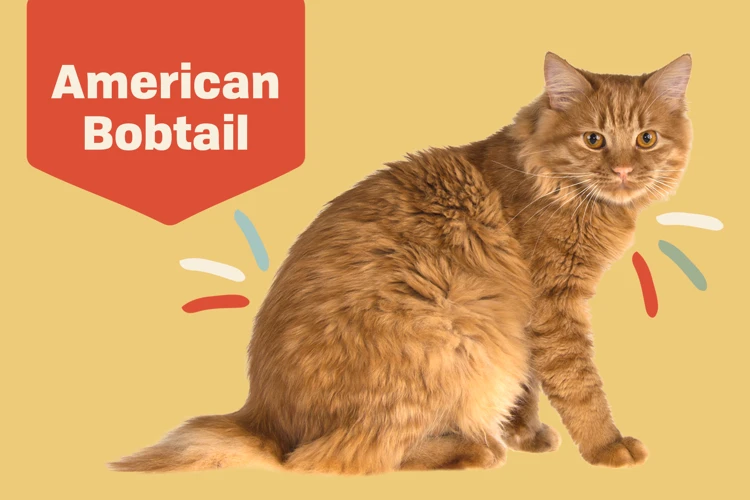
Maintaining dental health is just as important for our feline friends as it is for us humans. American Bobtails are no exception to this rule. Healthy teeth and gums not only help your American Bobtail maintain a beautiful smile, but also improve overall health and well-being. Poor dental health can lead to more serious issues such as gum disease and tooth decay, which can be both painful and costly to treat. In this article, we will explore the oral health problems that can affect American Bobtails, and provide you with valuable tips for maintaining your cat’s dental health.
Oral Health Problems in American Bobtails
Maintaining good oral health is essential for American Bobtails. Unfortunately, many cats, including American Bobtails, experience oral health problems. These issues can cause significant pain and discomfort to the cat, and in extreme cases, may require veterinary intervention. Here are some of the most common oral health problems that American Bobtails may face:
- Periodontal disease: This is a bacterial infection that affects the gums and other supporting structures of the teeth. Without proper dental care, it can cause tooth loss and damage to the jawbone.
- Tooth resorption: This is a condition in which the cat’s body reabsorbs the tooth, exposing the pulp. Tooth resorption is painful and can cause swelling of the gums, bleeding, and difficulty eating.
- Gingivitis: This is a common dental problem among cats characterized by red, swollen gums that bleed easily. It can cause discomfort and pain in the cat and is often the first sign of periodontal disease.
- Oral cancer: Although not as common as other dental problems, oral cancer is a severe condition that can cause the cat to lose their teeth and have difficulty eating.
It’s essential to detect these oral health problems in cats as they can cause significant pain and discomfort to them. Regular dental checkups and cleaning are necessary. You can learn more about dental care for American Bobtails at /dental-care-american-bobtails/ to help prevent such dental problems.
The Link between Diet and Dental Health
Maintaining good dental health is essential for American Bobtails, and their diet is a significant factor that can affect their dental health. Poor quality food can lead to dental problems such as plaque buildup, tartar accumulation, and bad breath in American Bobtails. On the other hand, a healthy diet can promote strong teeth and gums. Here are some ways in which diet can affect dental health:
- Sugar and Carbohydrates: Foods that are high in sugar and carbohydrates can cause tooth decay in American Bobtails. These types of food can react with bacteria in the mouth to produce acid that damages the enamel of their teeth. It’s important to limit your cat’s intake of sugary treats and starchy foods like bread and pasta.
- Protein: Protein is an essential nutrient for American Bobtails, and it’s also necessary for maintaining healthy teeth and gums. It helps repair and rebuild tissues, including those in the mouth. Make sure your cat’s diet includes high-quality sources of protein, such as meat, fish, and poultry.
- Chewing: Chewing is a natural way for American Bobtails to keep their teeth clean and strong. When they chew on certain foods, it helps remove plaque and tartar from their teeth. Raw bones, for example, can be an excellent source of natural dental care for your cat. Always supervise your cat while they’re chewing to avoid any potential choking hazards, and make sure to provide access to fresh water.
- Vitamins and Minerals: Vitamins and minerals like calcium, phosphorus, and vitamin D are essential for strong teeth and bones. You can find these nutrients in a variety of foods, including dairy products, green leafy vegetables, and fish.
To keep your American Bobtail’s teeth and gums healthy, it’s important to feed them a well-balanced diet that includes all of these essential nutrients. Avoid feeding your cat sugary treats and stick to high-quality, protein-rich foods. Additionally, you can supplement your cat’s diet with dental chews and raw bones to help promote healthy teeth and gums. However, if your cat is experiencing dental problems, such as bad breath or gum inflammation, it’s important to take them to the veterinarian.
For more information on maintaining your American Bobtail’s dental health, please visit our article on brushing their teeth. And for recommendations on dental care products for your cat, check out our article on dental care products for American Bobtails. If your cat is experiencing dental problems, make sure to read our article on common dental problems in American Bobtails.
Dietary Tips for Maintaining American Bobtail Dental Health
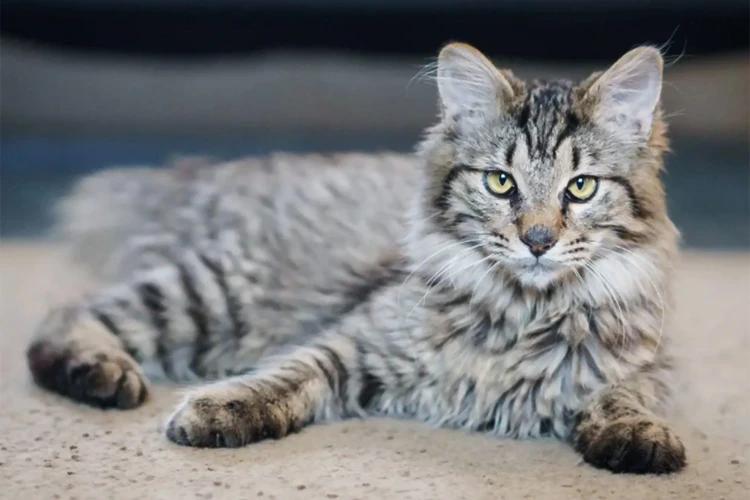
As a pet owner, you make sure to prioritize the health and well-being of your furry friend. However, when it comes to maintaining your American Bobtail’s dental health, you may not know where to start. Fortunately, there are several dietary tips that you can follow to ensure that your cat’s teeth and gums stay in tip-top shape. By incorporating these tips into your cat’s diet, you can help prevent common oral health problems in American Bobtails and keep your pet’s smile healthy and happy. Let’s take a look at some of the best dietary tips for maintaining your American Bobtail’s dental health.
Feed Your Cat High-Quality Food
One of the most important factors for maintaining your American Bobtail’s dental health is providing them with high-quality food. Feeding your cat a balanced and nutritious diet can help to prevent a variety of health problems, including those affecting their teeth and gums.
When selecting food for your American Bobtail, it is crucial to read the labels and choose a product that is high in protein and low in carbohydrates. Look for a food that contains real meat as the first ingredient, rather than fillers such as corn or wheat. These fillers can cause plaque buildup on your cat’s teeth, leading to dental problems.
A simple way to compare different types of cat food is by using an html table. Here’s an example of how you can compare three different brands of cat food:
| Brand | Protein Content (%) | Carbohydrate Content (%) | First Ingredient |
|---|---|---|---|
| Brand A | 35% | 25% | Chicken |
| Brand B | 28% | 35% | Corn |
| Brand C | 40% | 20% | Turkey |
As you can see in this example, Brand A contains the highest percentage of protein and the lowest percentage of carbohydrates, making it the best choice for maintaining your American Bobtail’s dental health.
In addition to selecting high-quality food, it’s important to monitor your cat’s food intake and ensure they aren’t overeating. Obesity can lead to a variety of health problems, including dental issues. Follow the feeding guidelines on the cat food packaging and avoid overfeeding your American Bobtail to maintain their overall health.
Remember that your cat’s dental health is closely linked to their overall well-being. By providing them with high-quality food and monitoring their diet, you can help to minimize their risk of developing oral health problems.
Add Dental Chews to Your Cat’s Diet
Keeping your American Bobtail’s dental health in check is not an easy task. Fortunately, dental chews offer an excellent solution to help maintain their dental hygiene. Dental chews help reduce tartar and plaque buildup while also keeping their gums healthy. When selecting dental chews for your American Bobtail, always look for products that are specifically designed for cats.
Here are some dental chews you can add to your cat’s diet:
- Catnip Dental Treats: Catnip dental treats not only freshen your American Bobtail’s breath but also help clean teeth by removing tartar and plaque. Plus, the added catnip makes it enjoyable for your cat to chew on, making it a win-win situation for both of you.
- Chew Toys: Chew toys, such as rubber balls or soft toys, can help reduce plaque buildup on your cat’s teeth. These toys help massage their gums and reduce stress and anxiety as well.
- Dental Chews: Dental chews come in various flavors and sizes and are specifically designed to clean teeth and freshen breath. They are also low in calories, making them a great addition to your American Bobtail’s diet.
- Dental Treats: Dental treats are tasty and chewy, helping to scrape tartar off teeth and massage gums. They are also a great way to bond with your cat while improving their dental hygiene.
Dental chews are a simple and effective way to maintain your American Bobtail’s dental health. Along with their numerous health benefits, dental chews can also help relieve your cat’s boredom and anxiety, keeping them happy and healthy.
Give Your Cat Raw Bones to Chew On
American Bobtails have strong jaws and a natural urge to chew, making raw bones an excellent addition to their diet. Raw bones provide a great source of calcium and phosphorus, essential minerals for keeping your cat’s teeth and bones healthy. When it comes to giving your cat raw bones, there are a few important things to keep in mind.
The Dos:
- Choose raw, meaty bones such as chicken wings or turkey necks.
- Make sure the bones are fresh and have not been cooked.
- Supervise your cat while they are chewing the bone.
- Remove any small bone fragments when your cat is finished.
The Don’ts:
- Never give your cat cooked bones as they can splinter and cause serious injury.
- Avoid giving your cat large or weight-bearing bones such as beef femurs, as they can cause dental fractures.
- Do not give your cat bones that are small enough to be swallowed whole.
When introducing raw bones to your cat’s diet, start small and monitor their chewing habits. If your cat is a voracious chewer, consider grinding the bone first or giving them larger pieces to satisfy their urge to chew without risking a dental injury.
Raw bones are an excellent addition to your American Bobtail’s diet and a great way to promote healthy teeth and gums. However, it’s important to follow these dos and don’ts to keep your cat safe and healthy.
Offer Your Cat Fresh Fruits and Vegetables
Incorporating fresh fruits and vegetables into your American Bobtail’s diet can be highly beneficial for their oral health. Not only do certain fruits and vegetables contain essential vitamins and minerals, but they also help to mechanically clean your cat’s teeth.
Here are some fruits and vegetables that can benefit your cat’s dental health:
- Carrots: Carrots are an excellent source of vitamin A and fiber, which both promote good oral health. The crunchy texture of carrots also helps to scrape away plaque and tartar as your cat chews.
- Apples: Apples are another great source of fiber, as well as vitamin C. The fibrous texture of apples can help to clean your cat’s teeth as they chew, and the natural sugars in apples can freshen their breath.
- Bell peppers: Bell peppers are packed with vitamin C, which can help to reduce inflammation and prevent infections in your cat’s mouth. Their crunchy texture also provides abrasion to help remove plaque and tartar.
- Celery: Celery is high in vitamins A and C, and its stringy texture can act like dental floss to help remove food and debris from your cat’s teeth.
It’s important to note that while fruits and vegetables can offer many oral health benefits for your American Bobtail, they should be given in moderation. Too much fruit can lead to diarrhea, and some vegetables such as onions and garlic can be toxic to cats. As always, consult with your veterinarian before adding any new foods to your cat’s diet.
Additional Tips for Preventing Dental Problems in American Bobtails
As an American Bobtail owner, you want to ensure your feline companion stays healthy and happy. Dental health plays a vital role in your cat’s overall well-being, and taking proper care of their teeth can prevent painful oral health problems down the line. In addition to the dietary tips outlined earlier, there are several other ways to promote your American Bobtail’s dental health. In this section, we will explore additional tips that will help prevent dental problems in your beloved pet.
Schedule Regular Veterinary Dental Checkups
One of the important steps to maintain the dental health of your American Bobtail is to ensure they have regular veterinary dental checkups. During these checkups, your vet will exam your cat’s teeth, gums, and mouth to assess their overall dental health. They can also identify any potential oral health problems early, preventing them from becoming more severe later on.
How Often Should You Schedule Veterinary Dental Checkups?
It’s recommended that you schedule your American Bobtail’s dental checkup at least once a year. However, the frequency of checkups may vary depending on your cat’s overall health condition and age. Older cats and those with dental issues may require more frequent checkups to maintain their dental health.
What to Expect During a Veterinary Dental Checkup?
During a veterinary dental checkup, the vet will perform a thorough examination of your cat’s teeth, gums, and mouth. They will look for any signs of tartar buildup, gingivitis, loose or broken teeth, and other potential dental problems. They can also take dental x-rays to evaluate the overall health of your cat’s teeth and identify any underlying dental issues.
If your cat is diagnosed with dental disease, the vet may recommend a professional dental cleaning to remove the tartar and plaque buildup. They can also treat any oral health issues found during the examination.
Benefits of Regular Veterinary Dental Checkups
Regular dental checkups can benefit your American Bobtail in several ways, including:
| Benefits | Description |
| Prevention of Dental Disease | Regular dental checkups can prevent the development of dental disease and identify oral health issues early. |
| Pain Management | The vet can identify any dental problems that may cause your cat pain and provide treatment to alleviate the pain. |
| Early Diagnosis of Systemic Diseases | The vet can identify any dental issues that may be associated with systemic diseases such as kidney disease, heart disease, or diabetes. |
| Improved Overall Health | Good dental health can improve your cat’s overall health and well-being. |
Scheduling regular veterinary dental checkups for your American Bobtail is an important step in maintaining their dental health and preventing dental issues. By working with your vet, you can help ensure your cat has a healthy and happy life.
Provide Your Cat with Plenty of Fresh Water
Proper hydration is crucial for maintaining the dental health of American Bobtails. By providing your cat with plenty of fresh water, you can help keep their mouth clean and prevent oral health problems. It is recommended to have multiple sources of clean water available throughout your home. Not only does this guarantee access to fresh water, but it also encourages your cat to drink more often.
One way to ensure your cat is drinking enough water is to invest in a pet water fountain. These fountains are designed to filter and circulate the water, keeping it fresh and appealing to cats. Your American Bobtail may prefer drinking from a fountain rather than a stagnant bowl.
Another way to encourage your cat to drink more water is to make their environment stimulating and engaging. American Bobtails are active and curious cats, so providing them with toys, scratching posts, and perches can pique their interest and stimulate their thirst. By encouraging your cat to drink more water, you decrease their chances of developing dehydration-related dental problems.
It is important to note that the water quality can also affect your cat’s dental health. Make sure the water you provide is clean and free of impurities. Consider a water filtration system or providing bottled water if the tap water in your area is not of high quality.
Overall, providing your American Bobtail with plenty of fresh water is a simple and effective way to maintain their dental health. Be sure to regularly clean their water bowls or fountains, and monitor their water intake to ensure they are staying hydrated.
Brush Your Cat’s Teeth Regularly
Maintaining your American Bobtail’s dental health is crucial to their overall well-being, and one of the best ways to achieve this is by regularly brushing their teeth. Brushing your cat’s teeth might sound impossible or even intimidating, but with patience and practice, it can become a routine part of your pet care regimen.
Why Is Brushing Your Cat’s Teeth Important?
Regular brushing helps prevent the buildup of plaque and tartar on your American Bobtail’s teeth, which can lead to a variety of dental problems. When left untreated, dental issues can cause pain, discomfort, and even tooth loss. Poor dental health can also lead to other health problems, such as heart disease, as harmful bacteria in the mouth enters the bloodstream and spreads throughout the body.
How To Brush Your Cat’s Teeth
Before you begin brushing your cat’s teeth, ensure that you use toothpaste that is specifically formulated for cats. Human toothpaste contains ingredients that can be harmful to pets if ingested. You will also need a soft-bristled toothbrush. Never use a hard brush, as it can damage your cat’s teeth and gums.
Follow these steps to brush your American Bobtail’s teeth:
| Step | Description |
|---|---|
| Step 1 | Get your cat used to having their mouth touched by gently rubbing your finger along their gums, lips, and teeth. Use a flavored toothpaste or tuna juice to make it more enjoyable for your cat. |
| Step 2 | Once your cat is comfortable, introduce the toothbrush. Apply a small amount of toothpaste to the brush and gently brush your cat’s teeth in a circular motion, focusing on the gum line. |
| Step 3 | Pay attention to your cat’s body language, and stop if they seem uncomfortable or agitated. Gradually increase the brushing time over several sessions until you can brush your cat’s teeth for a full two minutes. |
Tips for Successful Teeth Brushing
Here are some tips to make teeth brushing a little easier and more successful:
- Start early: Introduce tooth brushing to your American Bobtail when they are still a kitten to help them get used to the sensation.
- Be gentle: Use a light touch when brushing your cat’s teeth, especially around the gum line. Use small, circular motions and avoid scrubbing back and forth.
- Use positive reinforcement: Reward your cat with praise or a small treat after each brushing session to reinforce good behavior.
- Be patient: Some cats will never love having their teeth brushed, so be patient and consistent with your efforts. Always end on a positive note and try again the next day.
By incorporating regular teeth brushing into your American Bobtail’s dental care routine, you can help ensure that their teeth remain healthy and strong. Remember to stay patient and positive, and always reward good behavior.
Conclusion
After going through the above information, it is clear that dental health is extremely important for American Bobtails. Their oral health problems can lead to severe issues and can impact their quality of life. As a responsible owner, it is crucial to take preventive measures to maintain your cat’s dental health.
Feeding high-quality food is the initial step in maintaining dental health. The use of dental chews and raw bones, along with a healthy diet, can significantly benefit your cat’s teeth. Incorporating fresh fruits and vegetables in your cat’s meals can also combat bad breath, prevent plaque and tartar buildup, and strengthen teeth.
Additionally, scheduling regular veterinary dental checkups and providing your cat with fresh water are vital to ensure good oral hygiene. Regular checkups help to identify any underlying dental issues before they become major concerns. Lastly, brushing your cat’s teeth regularly can help prevent periodontal diseases and promote healthy gums and teeth.
By implementing these dietary and preventive tips, you can protect your American Bobtail’s dental health and contribute to their overall well-being. Remember, a little care goes a long way, and your furry friend will thank you for taking care of their teeth and gums.
Frequently Asked Questions
1. How often should I schedule veterinary dental checkups for my American Bobtail?
It’s recommended to schedule annual veterinary dental checkups for your American Bobtail, even if they appear to have good dental health.
2. Are there any specific oral health problems to look out for in American Bobtails?
American Bobtails are prone to periodontal disease and tooth decay, so it’s important to regularly check their teeth and gums for any signs of these issues.
3. Can I feed my American Bobtail homemade cat food to improve their dental health?
Homemade cat food can be an effective way to improve your American Bobtail’s dental health, but it’s important to ensure that their diet is nutritionally balanced and meets all of their needs. Consult with your veterinarian before making any significant changes to your cat’s diet.
4. What kind of dental chews are best for American Bobtails?
Dental chews that are designed specifically for cats and promote dental health are the best choice for American Bobtails. Look for those that contain enzymes that fight plaque and tartar buildup.
5. Can raw bones improve my American Bobtail’s dental health?
Yes, giving your American Bobtail raw bones to chew on can help scrape away plaque and tartar buildup and reduce the risk of dental problems. Just make sure to supervise your cat while they’re chewing to avoid any choking hazards.
6. How much fresh fruits and vegetables should I give my American Bobtail?
A small amount of fresh fruits and vegetables can be a healthy addition to your American Bobtail’s diet, but it’s important to limit the amount to avoid overloading their system with too much fiber. Consult with your veterinarian to determine the appropriate amount for your cat.
7. How can I encourage my American Bobtail to drink more water?
Offering fresh, clean water in multiple locations throughout your home can encourage your American Bobtail to drink more. You can also consider using a cat fountain or adding low-sodium chicken broth to their water to make it more enticing.
8. Is it important to brush my American Bobtail’s teeth?
Yes, brushing your American Bobtail’s teeth on a regular basis can help prevent dental problems and maintain good oral health. Start slowly and gradually increase the amount of time you spend brushing over time to help your cat get used to the process.
9. Can dental treats help improve my American Bobtail’s oral health?
Yes, dental treats that are designed to promote good oral health can be an effective addition to your American Bobtail’s diet. Look for those that are specifically formulated to reduce plaque and tartar buildup.
10. What else can I do to promote good dental health in my American Bobtail?
Aside from a healthy diet and regular dental care, providing your American Bobtail with plenty of opportunities to exercise and play can help promote good overall health and reduce the risk of dental problems.

